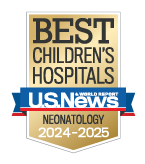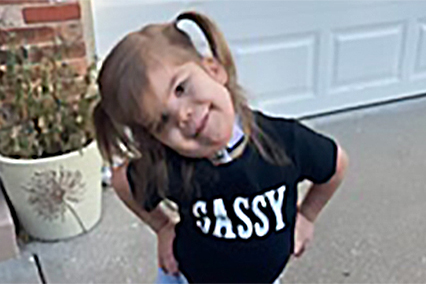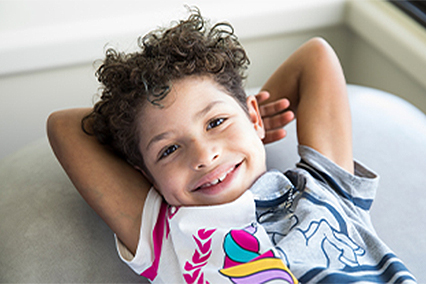Infant Tracheostomy and Home Ventilator Program
The region's highest level NICU.

The Infant Tracheostomy and Home Ventilator team cares for babies and toddlers who need a tracheostomy, with or without a ventilator, to provide them the right amount of breathing support. This allows your family to safely care for your baby at home rather than prolonging their hospital stay.
All-around support from your tracheostomy team
Even before a tracheostomy (often called a trach) is placed, our team provides support to your family and your child’s inpatient team at the hospital. Our goal is to help you feel comfortable about your child’s routine and how to care for them at home before you go home from the hospital.
Our team is here to answer all your questions and address any needs that arise as you learn how to care for your baby’s trach. Along with extensive training and printed instruction guides, you can reach our team 24 hours a day for any questions or concerns you have after discharge.
One clinic, many services
The Infant Tracheostomy and Home Ventilator Clinic functions as a medical home—a clinic where you can access care for most of your child’s medical needs in one place. We are able to provide routine well-child care, vaccinations, and health screenings in addition to tracheostomy- and ventilator-specific care. We help to coordinate the many subspecialties that your child may require, such as ENT, GI, and Pulmonology, to make it easier for your family.
If your family lives at a distance from Children’s Mercy, we recommend that you identify a local primary care provider to assist you with routine medical care closer to home. Our team is always available to provide consultative services for community providers who are caring for children with complex medical needs.
Meet the team
You can expect to meet the following care providers while your child is part of the Infant Tracheostomy and Home Ventilator Program:
Our physicians are board certified neonatologists and pediatricians. They have a special interest and extensive experience in caring for children with artificial airways and who require the support of a ventilator long-term.
We also have close partnerships with ENT, GI, Cardiology, and Pulmonology specialists and work closely with them to provide the extra support and specialized care your baby requires.
Our nurse practitioners are board certified and experienced in caring for children with a tracheostomy, with or without a ventilator. They work closely with our physicians to provide consistency and excellent communication between the care team and your family.
We know through research and experience that growth and nutrition are big factors for helping children achieve medical milestones as they grow. For kids with a tracheostomy, getting enough nutrition to support their growth is a great way to help them toward the goal of breathing well without ventilator support and ultimately, getting the tracheostomy tube removed.
The Infant Tracheostomy and Home Ventilator clinic has a dedicated dietitian who will closely monitor your child’s growth and nutrition at each clinic visit. Our dietitian is also available to discuss your questions and concerns related to feeding and growth between clinic visits.
Having a medically complex child at home adds many new stressors to your family. Because of this, we have a dedicated social worker to provide your family with the additional support and resources you need that are of a non-medical nature. Your social worker will provide individualized care and resources as needed throughout your child’s trach journey.
Tracheostomy Patient Family Advisory Council
The Tracheostomy Patient and Family Advisory Council (PFAC) focuses on improving the hospital and community experience for children with trachs and their families.
The region's highest level NICU.
The region's highest level NICU.
Our program provides comprehensive services for children with a trach and/or vent, including:
- Well-child checks, including vaccinations and health screenings
- Ventilator/tracheostomy visits
- Sick visits
- 24-hour provider on call
- In-person and telehealth appointments
- Management of nutrition to make sure your child is growing well
- Coordination of appointments to limit the number of trips your family must make to the clinic or hospital
- Family-centered team approach
- Coordination of in-home private duty nursing, medical supplies, and equipment services
- Mental health support for families and caregivers from a developmental psychologist when needed
Conditions
Babies need a tracheostomy for many different reasons. Here are some (but not all) of the conditions that often require a child to breathe with the help of a trach and/or ventilator for a time:
- Bronchopulmonary dysplasia – the condition that results from a baby being born very early with immature lungs
- Tracheobronchomalacia – when an airway is not as rigid as it needs to be (sometimes referred to as floppy airway)
- Congenital central hypoventilation syndrome – a genetic disorder that causes a baby not to breathe when asleep
- Upper airway obstruction – a blockage in the airway that often requires a tracheostomy but not a ventilator to breathe effectively
- Neurological disorders – this could include hypotonia (low muscle tone), brain dysfunction, or anything that makes it hard for a child to breathe or clear their mucous
- Genetic disorders – this could be something that affects the airway or the lungs
- Congenital heart disease (sometimes having a problem with the heart will mean a child needs a ventilator for a longer time)
Upcoming Events
Trachapalooza is a social gathering for trach families to make connections and support each other. This event is currently on hold due to COVID-19.
Children’s Mercy Dream Big Day is a family-friendly celebration to rally our community around Children’s Mercy and raise funds to provide answers, hope and care to patients and their families! With your support, any dream—big or small—can become a reality.
Osteopathia striata with cranial sclerosis: Emersyn’s story
Pink tutus and Peppa Pig are just two of the things 4-year-old Emersyn Gross loves. Find out how Children’s Mercy helped diagnose and treat her rare genetic condition so she can enjoy being a kid.

Tracheostomy Program: Kieesha's story
If you want to know what life with a tracheostomy is like, just ask Kieesha. With the help of the Children's Mercy Tracheostomy Team, she's successfully managed life with a trach for almost all of her 9 years. In spite of her complex medical needs, Kieesha doesn't let her trach slow her down.

Resources for families
Contact us
For more information or questions about the program, call (816) 234-3593. Existing patients can send a message to your care team through the Patient Portal.